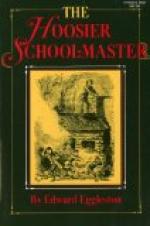FOOTNOTES:
[Footnote 24: Some time after this book appeared Dr. Brown-Sequard announced his theory of the dual brain. A writer in an English magazine called attention to the fact that the discovery had been anticipated by an imaginative writer, and cited the passage in the text as proving that the author of “The Hoosier School-Master” had outrun Dr. Brown-Sequard in perceiving the duality of the brain. It is a matter for surprise that an author, even an “imaginative” one, should have made so great a discovery without suspecting its meaning until it was explained by some one else.]
[Footnote 25: The reader may be interested to know that “Phil” was drawn from the life, as was old Mowley and in part “General Jackson” also. Between 1867 and 1870, I visited many jails and poor-houses with philanthropic purpose, publishing the results of my examination in some cases in The Chicago Tribune. Some of the abuses pointed out were reformed, others linger till this day, I believe.]
CHAPTER XXIV.
THE GOOD SAMARITAN.
The Methodist church to which Mrs. Matilda White and Miss Nancy Sawyer belonged was the leading one in Lewisburg, as it was in most county-seat villages in Indiana. If I may be permitted to express my candid and charitable opinion of the difference between the two women, I shall have to use the old Quaker locution, and say that Miss Sawyer was a Methodist and likewise a Christian; Mrs. White was a Methodist, but I fear she was not likewise.
As to the first part of this assertion, there was no room to doubt Miss Nancy’s piety. She could get happy in class-meeting (for who had a better right?), and could witness a good experience in the quarterly love-feast. But it is not upon these grounds that I base my opinion of Miss Nancy. Do not even the Pharisees the same? She never dreamed that she had any right to speak of “Christian Perfection” (which, as Mrs. Partington said of total depravity, is an excellent doctrine if it is lived up to); but when a woman’s heart is full of devout affections and good purposes, when her head devises liberal and Christlike things, when her hands are always open to the poor and always busy with acts of love and self-denial, and when her feet are ever eager to run upon errands of mercy, why, if there be anything worthy of being called Christian Perfection in this world of imperfection, I do not know why such an one does not possess it. What need of analyzing her experiences in vacuo to find out the state of her soul?
How Miss Nancy managed to live on her slender income and be so generous was a perpetual source of perplexity to the gossips of Lewisburg. And now that she declared that Mrs. Thomson and Shocky should not return to the poor-house there was a general outcry from the whole Committee of Intermeddlers that she would bring herself to the poor-house before she died. But Nancy Sawyer was the richest woman in Lewisburg, though nobody knew it, and though she herself did not once suspect it.




